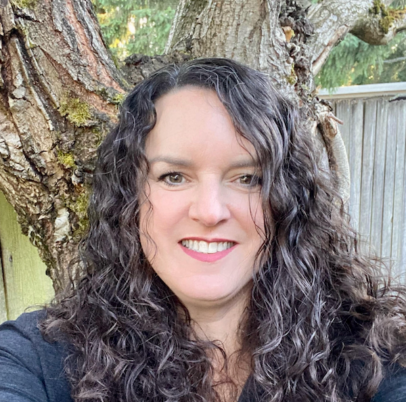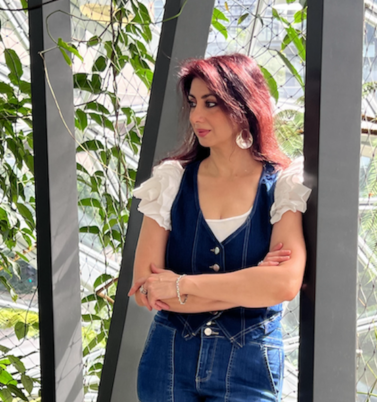CPTC faculty share expertise beyond the classroom
By Jean Borst
Clover Park Technical College faculty make academic contributions that go far beyond their classrooms – including publishing field-specific research and presenting at national and global conferences.
Dionna Faherty, English instructor and faculty lead for the Teaching and Learning Center, and Rasha Al-Tameemi, PhD, Architectural Engineering Design instructor, are stellar examples.
Harnessing AI in the English classroom

With Artificial Intelligence (AI) reshaping traditional education and the way students learn, Dionna Faherty has jumped on the AI bandwagon with a fervor. Her own experiences are helping other instructors to embrace the technology and its potential uses in college English classrooms.
AI done right
A self-professed “purveyor of AI awesomeness,” Faherty was invited to present two sessions at the Teaching and Learning with AI conference at the University of Central Florida in June. The conference brings together college and university instructors, professionals, librarians, researchers and policymakers from across the country and around the world to explore the potential of AI across higher education.
Presenting at this year’s event was a full-circle moment for Faherty. After attending last year’s inaugural Teaching and Learning with AI conference, she completely revamped her curriculum to incorporate the technology in her English classes.
“I immediately saw the importance of teaching it,” she said.
Her conference sessions focused on how she inserted generative AI into her courses and how she demonstrates the appropriate ways for students to use it in their writing assignments to brainstorm ideas, outline topics and find themes. She also shared what’s worked and what hasn’t in her classrooms and how students have responded to using AI tools.
“The most common feedback I receive is gratitude for showing them how this can help them,” Faherty said. “Many have been warned off AI, but I show them how it can be used to encourage more in-depth thinking and help them find their strongest writing voice.”
Sharing CPTC’s successes
Faherty’s approach to AI to enhance learning isn’t just a boon for her students. It’s also a playbook for college English instructors who are starting or struggling with their own AI journeys. She’s thrilled to have the opportunity to impart her experiences to help others find success.
“Presenting at academic conferences allows us to share the work we have been doing and connect with other colleges doing similar work,” Faherty said. “It’s an opportunity to show that CPTC is a leader in areas of student support and new education technology.”
It’s also a platform to dispel unfounded perceptions about community and technical colleges.
“Our institutions are sometimes written off by the larger college education world as ‘lesser than’ universities,” Faherty said. “This gives us a stage to show how important our work is and that we are a valuable resource and connection for other schools, as well as a valid path for students to find success in the post-college world.”
Delving into Tacoma’s quiet demeanor

In her published paper “Tacoma: The Quiet City,” Rasha Al-Tameemi examines how to revitalize downtown Tacoma to create a vibrant livable city while preserving its unique character, historic buildings and residents’ sense of belonging.
While Tacoma is a cultural center, home to many attractions and headquarters for several companies, Al-Tameemi found that most residents describe their city as “quiet.” They’re also more likely to visit other cities in the region or state for their entertainment and activities. Her paper raises several questions around the factors that affect downtown Tacoma and how it can be more livable and approachable.
For Al-Tameemi, her research offers multiple benefits. It not only serves as a valuable teaching tool for her higher-level students at CPTC to help bridge the gap between theories in architecture and real world experiences, but it also shines a positive light on Clover Park Technical College.
“Doing research papers builds the college’s reputation, especially when one is selected to be presented at an international conference,” Al-Tameemi said. “It shows the level of professors in the program and the quality of education students receive.”
Sharing, learning and building
Al-Tameemi presented her paper at the 2023 LIVEABLE CITIES – New York conference, a global gathering presented by the Architecture, Media, Politics, Society (AMPS) research organization. The conference focused on issues that affect life in cities, including architecture and design, city planning, health, technology, urban economics and social policy.
In addition to the opportunity to present her own research, participating in conferences like the LIVEABLE CITIES event is an opportunity for Al-Tameemi to gather with and learn from other experts.
“I get to build connections with other researchers and experts in the field, learn more skills and discover architecture and design in different parts of the world,” she said.
Love of research runs deep
Along with her role in academia, Al-Tameemi is a seasoned architect and designer with more than 15 years of professional design experience across a range of architectural disciplines, including residential, commercial, mixed-use and institutional projects. Her interest in field research goes back even further – and it hasn’t waned.
“I started researching the history and theory of architecture, urban design and cultural landscape before I got my master’s degree,” Al-Tameemi said. “Anytime I take a break from writing papers, I start to feel a little rusty.”